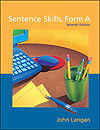 |  Sentence Skills, Form A, 7/e John Langan,
Atlantic Cape Community College
Sentence Variety 1
Key Terms
| clause | a word group that contains a subject and a verb (e.g., The dog ran.)
|  |  |  | | compound sentence | a "double" sentence made up of two or more simple sentences. Ex.: The rain increased, but the officials refused to cancel the game.
|  |  |  | | complex sentence | a sentence made up of a simple sentence and a clause (not a complete sentence) that begins with a dependent word
|  |  |  | | coordination | a way of showing the exact relationship of ideas in a sentence: coordination shows that ideas are of equal importance. Ex.: She realized she was wrong, and he forgave her.
|  |  |  | | dependent clause | a clause that does not express a complete thought in and of itself; it requires an independent clause to complete its meaning.Ex.:
| Because the store was closed, the girl went home. | | | dependent clause | independent clause |
|  |  |  | | dependent word | a word such as after, although, as, because, before, etc. that introduces a dependent clause
|  |  |  | | independent clause | a clause that expresses a complete thought in and of itself; it requires no other clause to complete its meaning.
| Ex.: | Because the store was closed, the girl went home. | | | dependent clause | independent clause |
|  |  |  | | simple sentence | a sentence with a simple subject-verb combination. Ex.: Children play.
|  |  |  | | subordinate clause | a group of words having a subject and a verb that does not express a complete thought and is not able to stand alone; also called a dependent clause. Ex.: Whenever I go to school.
|  |  |  | | subordination | a method of joining two complete thoughts that shows that one thought is not as important as the other thought; subordinate clauses begin with a dependent word (e.g., because, when, if, etc.)
|
|



 2003 McGraw-Hill Higher Education
2003 McGraw-Hill Higher Education

 2003 McGraw-Hill Higher Education
2003 McGraw-Hill Higher Education